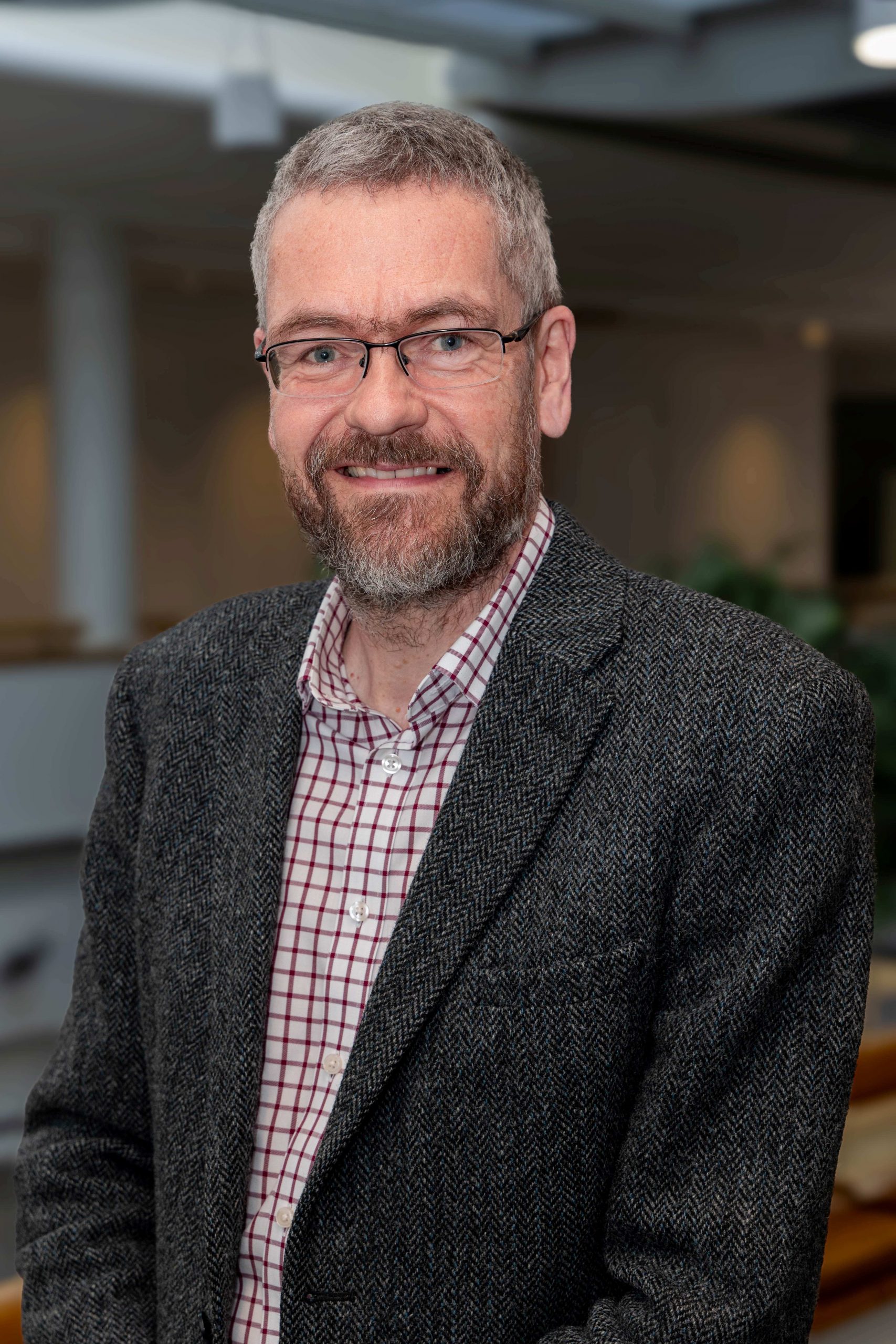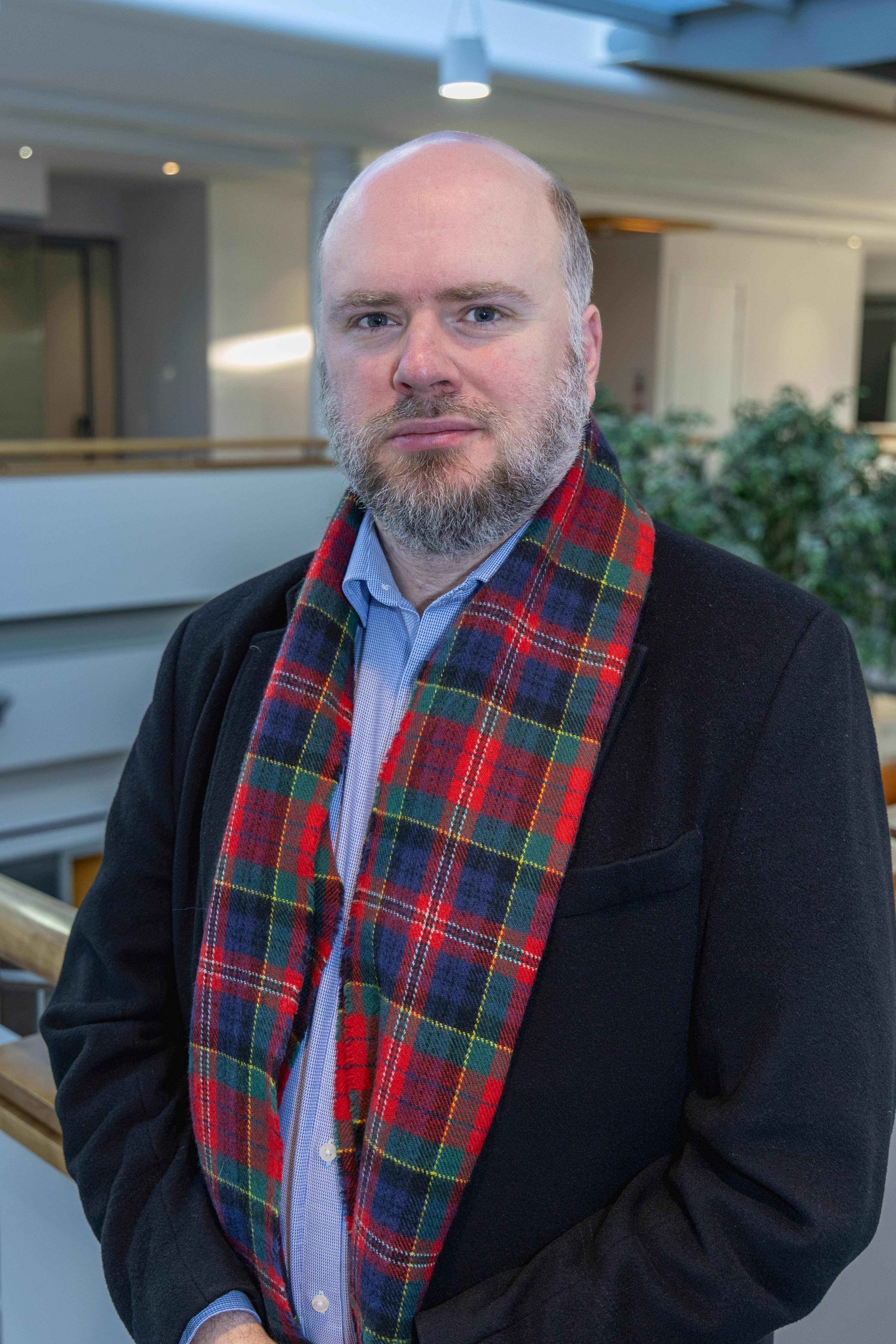The Smart Products Made Smarter team is comprised of researchers based at Heriot-Watt University, the University of Edinburgh and engineers based at Leonardo.
The project is managed by Professor Stephen McLaughlin (Director), Professor Duncan Hand (Deputy Director, Heriot-Watt University), Professor Mike Davies (Deputy Director, University of Edinburgh) and Dr Richard Carter (Partnership Training Programme Academic Coordinator). Janet Forbes is the Project Manager.
The team is drawn from:
Institute of Sensors, Signals and Systems at Heriot-Watt University
Institute of Photonics and Quantum Sciences at Heriot-Watt University
Institute for Imaging, Data and Communications at the University of Edinburgh
Institute for Materials and Processes at the University of Edinburgh
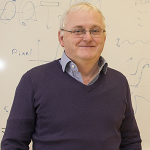
Prof. Steve McLaughlin (Director, Heriot-Watt University)
Professor Steve McLaughlin is the Vice-Principal and Provost of Heriot-Watt University. He joined the University as a Professor of Signal Processing in 2011, going on to become Executive Dean of the School of Engineering and Physical Sciences and our Deputy Principal for Research and Impact from 2022-2024. Prior to that he was a Development Engineer in industry and Chair in Electronic Communication Systems at Edinburgh University. Throughout his distinguished academic career, he has been providing excellent leadership with a firm focus on innovation.
Professor McLaughlin brings a wealth of experience and vision which strongly resonates with the University’s distinctive portfolio and values. He is a Fellow of the Institution of Engineering and Technology, the Institute of Electrical and Electronics Engineers, the European Signal Processing Association, the Royal Society of Edinburgh, and the Royal Academy of Engineering.
Research Profile on Pure Prof. Duncan Hand (Deputy Director, Heriot-Watt University)
Prof Duncan Hand has been at Heriot-Watt University since 1991, following his PhD studies at the University of Southampton. He leads research activity in applications of high power lasers, particularly in manufacturing, with additional work on optical sensing, and also on surgical applications of lasers. He is currently leading a suite of projects funded by EPSRC, Scottish Enterprise and industry. His manufacturing research encompasses micro-welding, surface modification, surface patterning, engraving, and micro-machining, covering a range of applications areas from ship engine parts to miniature medical devices. He is Director of the £12M, 5-university Medical Device Manufacturing Centre
www.mdmc.ac.uk. In addition to his research interests Duncan is currently Assistant Vice Principal for Research and Impact.
Research Profile on Pure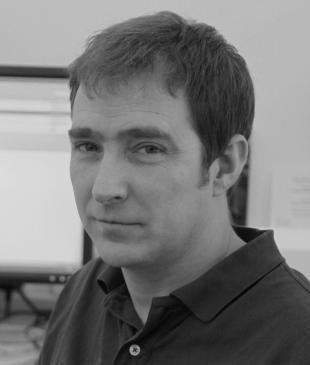
Prof. Mike Davies (Deputy Director, University of Edinburgh)
Mike Davies holds the Jeffrey Collins Chair in Signal and Image Processing in the School of Engineering at the University of Edinburgh where he is currently Director of Research. He was Head of the Institute for Digital Communications, now the Institute for Imaging, Data and Communications (IDCom) in the School of Engineering 2013-16 and Director of the Joint Research Institute in Signal and Image Processing (JRI-SIP) a the collaborative research venture between the University of Edinburgh and Heriot-Watt University as part of the Edinburgh Research Partnership.
He received an M.A. in engineering from Cambridge University in 1989 where he was awarded a Foundation Scholarship (1987), and a Ph.D. degree in nonlinear dynamics and signal processing from University College London (UCL) in 1993. In 1993 he was awarded a Royal Society University Research Fellowship. He currently manages a £7M portfolio of research grants from a variety of sources including: EPSRC, Dstl, industry, EU and the ERC, and leads the University Defence Research Collaboration (UDRC), a UK programme of signal processing research in defence in collaboration with the UK Defence Science and Technology Laboratory (Dstl).
Research Profile on PureDr Richard Carter (Partnership Training Programme Academic Coordinator and WP Leader (M2), Heriot-Watt University)
Richard graduated from the University of Edinburgh in 2005 with an MPhys, from the Universities of St-Andrews and Heriot-Watt with an MSc in photonics and opto-electronic devices in 2007 and in 2012 from Heriot-Watt with a PhD developing long period fibre gratings for environmental gas sensing. He joined the high power laser applications group at Heriot-Watt as a research associate investigating laser based production processes. In 2018 was appointed a Research Fellow (Lecturer) within the Institute for Photonics and Quantum Sciences at Heriot-Watt University and in 2021 promoted to his current role as Associate Professor with teaching responsibilities in both Physics and Mechanical Engineering. His research interests include the optical beam propagation and laser material interactions.
Research Profile on PureJanet Forbes (Project Manager, Heriot-Watt University)
Janet Forbes is the Project Manager for Smart Products Made Smarter Prosperity Partnership project at Heriot-Watt University in collaboration with the University of Edinburgh and Leonardo. She is a Prince2 certified Project Manager and (PMP)®with extensive experience in managing high-level research collaborations. Since 2013, she successfully managed the University Defence Research Collaboration (UDRC), a partnership between academia, industry, and defence, funded by Dstl and EPSRC. This collaboration focuses on advancing signal processing research within the defence sector. Janet led the development of the communications strategy, technology transfer, and reporting processes, ensuring smooth coordination between academic institutions, industry partners, and the defence sector.
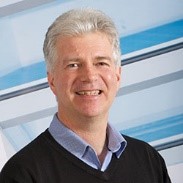
Prof. Johnathan Corney (WP Leader (S1) University of Edinburgh)
Jonathan is a mechanical engineer who has a particular interest in industrial automation and intelligent systems for manufacturing and design. He has been principal investigator on over £1.8Million of EPSRC funded research, published two books and over 80 papers on various aspects of CAD/CAM and advanced manufacturing. His academic career started at Heriot-Watt University where he worked extensively on geometric modelling, feature recognition and shape search systems. Since moving to the University of Strathclyde in 2007 he has worked manufacturing applications of crowdsourcing; Internet cloud interfaces for manufacturing and systems for interactive search of digital media. He has ongoing work on Near Net Shape manufacturing, advanced forming technologies (e.g. hydroforming and rotary forging) and the data mining of CAD/CAM data. He has been Co-Director of the ‘Scottish Institute of Remanufacturing’ since its formation.
Research Profile on Pure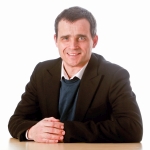
Prof. Daniel Esser (WP Leader (M1), Heriot-Watt University)
Prof Esser’s research background include key demonstrations of Nd-doped systems for 1 µm operation (Nd:YLF and Nd:YVO
4), Tm-doped systems at 1.9 µm (Tm:YLF, Tm:GdVO
4) and Ho-doped lasers and amplifiers for high energy 2 µm operation (Ho:YLF, Ho:LuLF). These lasers could be applied to defence, remote sensing and industrial processes. In addition to his publication outputs, he was also co-author and principle investigator for a number of technology demonstrators developed during industry-focussed research projects. Prof Esser is researching new materials, architectures and manufacturing methods of direct diode laser modules, diode-pumped solid-state lasers, as well as laser-based digital manufacturing. His group addresses the key challenges of power- and energy scaling of solid-state laser systems, focussing on high-brightness laser diodes, micro-optic beam shaping, thin-slab architectures and compact amplifier concepts. Novel manufacturing techniques, such as ultra-fast laser welding of glass-to-metal, autonomous robotic assembly and additive manufacturing are critically evaluated for their use and uptake in the design and manufacture of future industrial laser systems. The experimental research is underpinned by mathematical modelling and simulation of the required laser device physics and engineering, which is also applicable to a wider range of laser systems.
Research Profile on Pure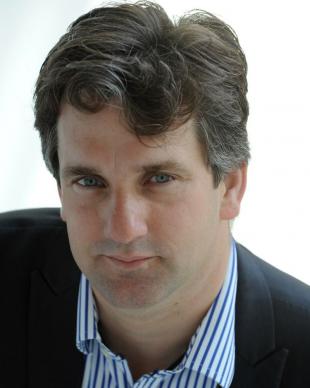
Prof. James Hopgood (WP Leader (M3) University of Edinburgh)
James Hopgood is Director of Electronics and Electrical Engineering, and a Senior Lecturer at the School of Engineering, at the University of Edinburgh, Scotland. His research specialisation include model-based Bayesian signal processing, speech and audio signal processing in adverse acoustic environments, including blind dereverberation and multi-target acoustic source localisation and tracking, single channel signal separation, distant speech recognition, audio-visual fusion, medical imaging, blind image deconvolution, and general statistical signal and image processing. James received the M.A., M.Eng. degree in Electrical and Information Sciences in 1997 and a Ph.D. in July 2001 in Statistical Signal Processing, part of Information Engineering, both from the University of Cambridge, England. He was then a Post-Doctoral Research Associate for the year after his Ph.D within the same group, at which point he became a Research Fellow at Queens’ College continuing his research in the Signal Processing Laboratory in Cambridge. James joined the University of Edinburgh in April 2004. Since September 2011, he is Editor-in-Chief for the IET Journal of Signal Processing.
Research Profile on Pure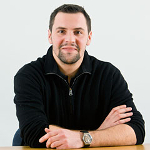
Prof. Yoann Altmann (WP Leader (S2) Heriot-Watt University
Yoann Altmann conducts his research within the Institute of Sensors, Signals and Systems in the School of Engineering and Physical Sciences. His current research activities focus on statistical signal and image processing, with a particular interest in Bayesian inverse problems with applications to single-photon Lidar, low-illumination imaging and hyperspectral imaging. Yoann Altmann received the Eng. degree in electrical engineering from the
ENSEEIHT, Toulouse, France, and the M.Sc. degree in Signal Processing from the
National Polytechnic Institute of Toulouse, both in June 2010. He completed his Ph.D. within the Signal and Communication Group of the
IRIT Laboratory in Toulouse in 2013. In 2014-2017, he worked as a post-doctoral research follow within the Institute of Sensors, Signals and Systems at HWU. Since 2017, he as been a Research Fellow of the Royal Academy of Engineering. He is now a Professor within the School of Engineering and Physical Sciences.
Research Profile on Pure

